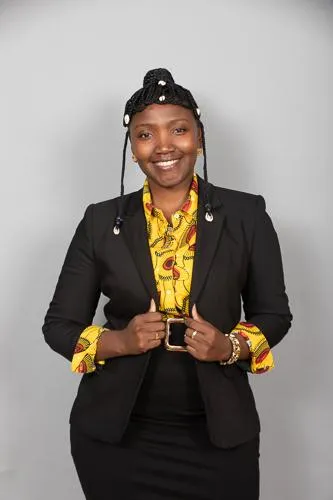Circular economy: The missing link in Africa’s corporate sustainability strategies

Dr. Gamuchirai Mutezo is the founder, Madam Waste.
Image: Supplied
When corporate leaders gather around sustainability tables, the focus often rests on compliance, reporting frameworks, carbon audits, and ESG disclosures. These are important components of a responsible business, but increasingly, they are no longer sufficient.
There is a strategic gap in how we think about sustainability, particularly across South Africa and the broader continent. It is a gap I call “the Circular Blind Spot”, and it is high time we address it. The Circular Economy (CE) is not a new concept, but it remains underutilised by African corporates. At its core, CE is about intentionally designing out waste, extending the life of resources, and regenerating natural systems. It shifts us away from the traditional linear model of take -> make -> dispose, and toward a regenerative one of reduce -> reuse -> recycle -> reinvent, amongst many other Rs.
Globally, CE is increasingly seen as a growth strategy, not just a sustainability buzzword. It aligns environmental responsibility with innovation, efficiency, and long-term resilience. Yet, across many boardrooms on the continent, it is still misunderstood, if considered at all. As a result, we are leaving value off the table: economic value, environmental value, and social value. For South African companies, integrating circularity into core business operations presents a high-impact, underexploited opportunity.
Corporates across sectors are already dealing with rising input costs, resource volatility, tightening regulations, consumer pressure, and reputational risk. Embedding circular economy principles can address these challenges while unlocking competitive advantages. Circularity is not about waste management alone. It is a design philosophy and a business model lens.
- In manufacturing, it means designing for disassembly, modularity, and repair.
- In agriculture, it means valorising organic waste into inputs like compost or biochar.
- In retail and fast-moving consumer goods (FMCG), it means embracing reuse models, sustainable packaging, and reverse logistics.
- In finance, it means backing regenerative models and green infrastructure, not just offsets.
Crucially, circularity does not require a company to be in the waste sector. The principles are adaptable across industries. What is required is intentionality and a shift in mindset. Let me stress that one more time - intentionality and a shift in mindset. There are already examples, albeit still few and far between, of African corporates embracing CE models:
- Woolworths, a leading South African retailer, has trialled closed-loop clothing initiatives and circular packaging pilots. Their vision for zero packaging waste by 2025 reflects CE thinking in action.
- Unilever East Africa has developed plastic take-back schemes and invested in recycled content manufacturing, aligning with both local regulations and circular product stewardship.
- Heineken South Africa has invested in biogas digesters at its Sedibeng Brewery to convert organic waste into energy, reducing both waste and operational costs.
If your business is just beginning to explore circularity, consider these entry points:
1 Material Flow Mapping: Conduct a material audit to understand what waste streams your operations generate across facilities, products, packaging, and logistics.
2 Design for Circularity: Reassess product and service design for longevity, reuse, or regeneration. Packaging, in particular, is a high-impact area.
3 Collaborate with Startups or Social Enterprises: Many small circular businesses already exist and offer upcycling, take-back systems, and localised processing. Partnering with them can extend your sustainability reach.
4 Procure Circularly: Shift procurement policies to favour suppliers using recycled content, modular systems, or regenerative inputs.
5 Communicate Beyond Compliance: Move from compliance-driven ESG reporting to impact-driven storytelling. Show how circularity fits within your brand’s vision for future relevance and resilience.
Of course, initial investments will be required to (re) design the mandates, systems, or partnerships. But, as demonstrated globally, the long-term benefits include cost savings, risk reduction, enhanced brand equity, and regulatory readiness. Circularity enables businesses to move from doing less harm to doing more good and that distinction matters. Circular models are not only climate-aligned; they are deeply development-aligned, particularly in the African context. Waste-to-value enterprises often create local jobs, build green skills, reduce environmental hazards, and strengthen community resilience. This is why I believe circular economy integration is a strategic imperative, not just an environmental gesture.
In my work with Madam Waste, we have seen firsthand how small, decentralised waste interventions can spark new business models, green enterprise, and youth employment. And in our knowledge-sharing platform, Not Wasting a Single Story, we showcase African changemakers already doing the work, often quietly, often without corporate support.
The time has come to bridge that gap. Sustainability is no longer a fringe concern for corporate South Africa. It is a strategic pillar. Yet for it to be truly effective, it must be reframed through a circular lens. Circularity offers corporates a way to reimagine their relationship with materials, energy, and society. It brings innovation into the boardroom and impact into the balance sheet. But like any paradigm shift, it requires leadership.
Business leaders have a choice: maintain outdated linear models, or embrace circular systems that are more adaptive, resilient, and regenerative.
The continent is watching. The climate is waiting. The opportunity is here.Let us not waste it.
Dr. Gamuchirai Mutezo is the founder of Madam Waste.
*** The views expressed here do not necessarily represent those of Independent Media or IOL.
BUSINESS REPORT